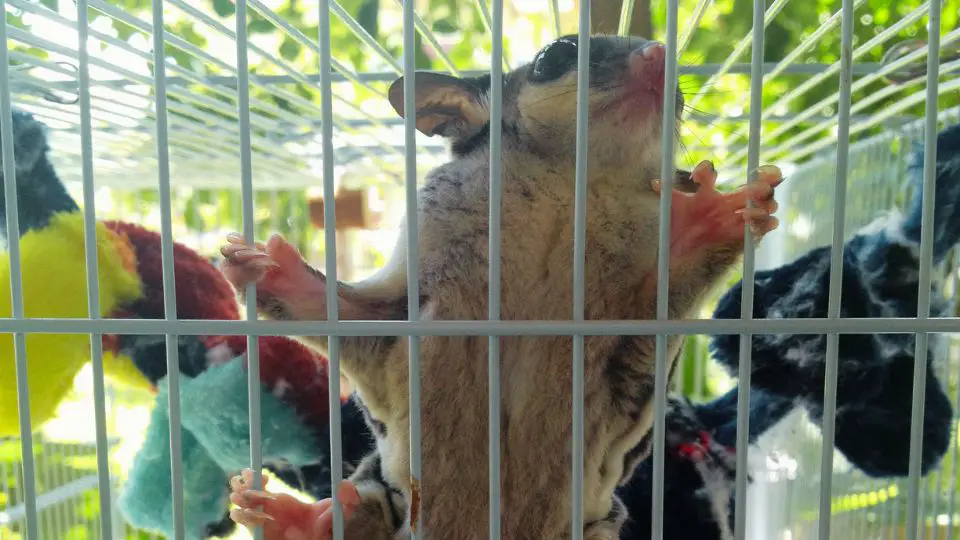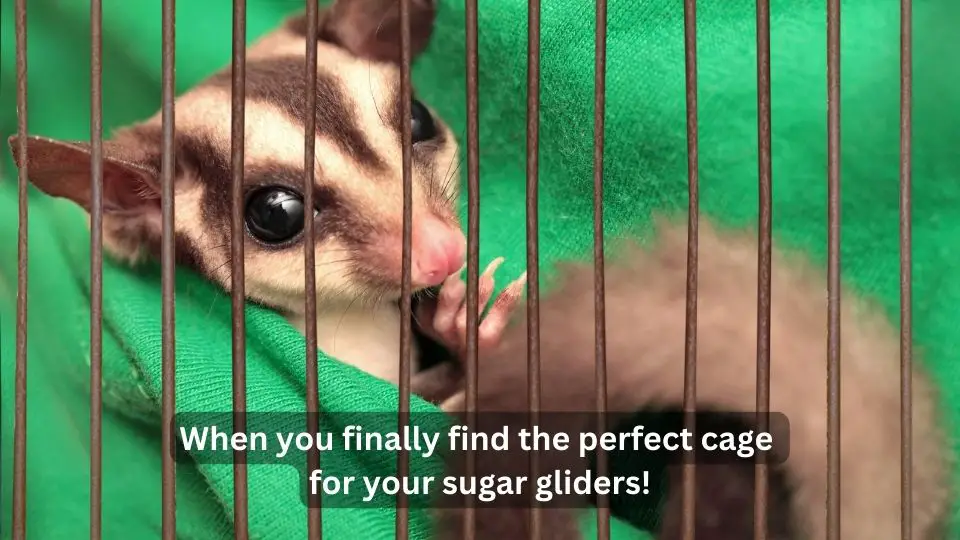If your sugar glider is shaking, it might be due to a number of reasons. If your glider is shaking in a strange way, you need to know whether there is a problem.
In this article, you’ll learn about the symptoms of stress in your glider, how to spot if your sugar glider is stressed, and how to diagnose stress in sugar gliders. You’ll have more peace of mind and a happier sugar glider.
Why is your sugar glider shaking
If your sugar glider is shaking, it is important to seek veterinary care immediately. Seizures, stress, toxin exposure, injury, and pain can all be serious conditions that require treatment. Here are a few reasons why your glider may be shaking.
Seizures
Sugar gliders can suffer from seizures if they have a calcium deficiency, hypoglycemia, or another illness. If your glider is having a seizure, you will need to take it to the vet immediately.
Stress
Sugar gliders may shake due to stress. If your glider is shaking in a strange way, it may be a sign of stress. There are a few things that can cause stress in sugar gliders, including:
- Loud noises;
- Changes in environment;
- Lack of social interaction;
- Lack of food or water.
If you think your sugar glider is stressed, you should take it to the vet to be sure.
Toxin exposure
If your glider has been exposed to pesticides, herbicides, or other chemicals, it may start shaking. This is a serious condition and you should take your glider to the vet immediately.
Bacterial infection
A bacterial infection, such as Actinomyces israelii, can cause your glider to have a swollen eye, vomiting, diarrhea, and other symptoms.
In addition, sugar gliders can also get infected after trauma or surgery. A lumpy jaw and an absces in the mouth are also common causes. If left untreated, they could even become dangerous.
Injury
Sugar gliders may shake due to an injury. If your glider has been in a fight or has fallen, it may start shaking. Reasons of injuries include:
- Fights with other animals;
- Falls;
- Changes in temperature.
Pain
Sugar gliders may shake due to pain. If your glider is in pain, it is important to seek veterinary care immediately.
Sugar gliders can be prone to shivering due to changes in temperature. Their preferred temperature is between 80 and 88 degrees Fahrenheit, and this means that normal house temperatures may fall below these temperatures.
If your sugar glider is shaking constantly, it may be suffering from nutritional deficiency, poor diet, or other health conditions.
How to tell if something is wrong with your sugar glider
Behaviour change
First of all, you should understand the behavior of your sugar glider. These animals do not normally shake, and their shaking behavior is usually a sign that they are ill.
Most animals are not supposed to shake when they are awake, so it may startle you to see your sugar glider shiver. While shaking is normal to some degree, it does indicate that your glider is experiencing a problem.
Lack of appetite
If your glider does not want to eat, it may be a sign that something is wrong. A loss of appetite can be caused by many different things, including stress, pain, and illness. If your glider is not eating, you should take it to the vet to be sure.
Signs of depression
Your sugar glider may be showing symptoms of illness or depression. If your pet is unable to play with toys, there may be an underlying cause. Poor nutrition is the main cause of many diseases in sugar gliders. Poor diets deficient in essential vitamins and minerals can lead to lameness or paralysis.
Is your sugar glider ill?
If your sugar glider is shaking, it could be a sign of a health problem. Sugar gliders are very small animals, and they need a specific diet in order to stay healthy. If they don’t get enough vitamins and minerals, they can develop problems like metabolic bone disease. This condition weakens the bones and can cause paralysis.
If your pet glider seems sick, it could be because of a variety of problems. While it’s impossible to diagnose every disease, some can be more serious than others. One of the most common diseases in sugar gliders is called toxoplasmosis. This disease is caused by a protozoan that can be found in cat feces and raw meat. The infection may cause your sugar glider to lose their energy and become malnourished.
The signs include dehydration, loss of coordination, and low body temperature. Your glider may also have a sore throat or a lump in their jaw. However, you can safely treat your sugar glider with a prescription medication.
When sugar gliders are suffering from general malnutrition, they may develop conditions like hind-limb paralysis and lack of energy. Other serious conditions include liver and kidney failure. If your glider has metabolic bone disease, treatment will include correcting the underlying nutritional issues, as well as supportive care.
You will want to see a veterinarian as soon as possible if you notice any of these symptoms. There’s no need to worry – it’s a relatively easy way to diagnose and treat your pet.
How to know if your sugar glider is stressed?
If your sugar glider is showing signs of stress, it’s probably because it’s hungry. It might bark in the cage to get more food, but it might also be stressed out because it’s afraid of you. The best way to prevent stress is to give it plenty of exercise. Keeping a sugar glider in an urban or industrial setting is a major cause of stress. Your glider may also be stressed out if you have other pets or live in a household with lots of noise.
A sugar glider may self-mutilate when stressed. It may bite its own body parts, such as its tail or wings. Blood may also pool on the cage bars or in a nest, indicating a wound. If you see any of these signs, you should take your glider to the vet to be sure there’s no underlying health problem.
Other signs of stress are loss of appetite, overgrooming, and hair loss. While these symptoms are common, they’re usually related to diseases.
How do you get your sugar glider to calm down?
One of the best ways to get your sugar glider to calm down is to offer it a small piece of fruit or a little bit of honey. Sugar gliders are very attracted to sweet tastes, and this can help to distract them from whatever is making them anxious.
You can also try stroking their fur in a gentle way, as this can be calming for them. If your sugar glider is still not settling down, you may need to give it some time in its cage to relax. Make sure that the cage is covered so that it feels safe and secure, and provide it with some toys or other items to keep it occupied.
With a little patience, you should be able to get your sugar glider to calm down.
When should you be worried about your sugar glider
Shaking is a pretty normal thing for your sugar glider to do. When sugar gliders first wake up, they shake more than usual. Shaking can also look like shivering, which most animals do when they are cold. This is because it is a quick and easy way for the body to warm up. If your house or sugar glider’s cage is colder than usual in the winter, it may shiver to stay warm.
Sugar gliders can live in temperatures from 60 to 90 degrees Fahrenheit (15 to 32 degrees Celsius), but 80 to 88 degrees Fahrenheit is more like what they like.
Shivering is a natural mechanism for your glider to warm up. However, it is important to understand that prolonged shaking may indicate a problem like MBD or a deficiency in calcium. If your sugar glider is shaking constantly, you should consult a veterinarian immediately.
If you notice that your glider is always shaky on its feet, not just when it wakes up, or if the shakiness never goes away, this could be a sign that something else is going on under the surface.
If you noticed that your sugar glider is shaking and it wasn’t just because it was waking up, it’s likely that it is having other problems.
Conclusion
If your sugar glider is shaking, it could be due to stress, hunger, or a health issue. If the shaking is prolonged or accompanied by other symptoms, take your sugar glider to the vet for an evaluation. With proper care and treatment, your sugar glider should be back to normal in no time.







